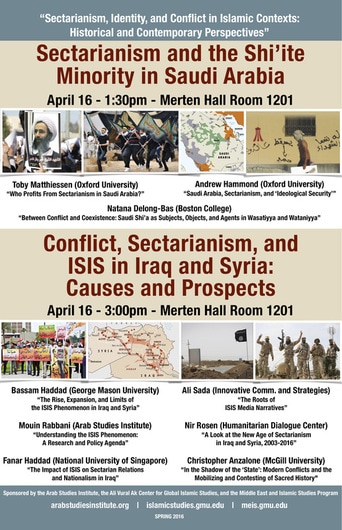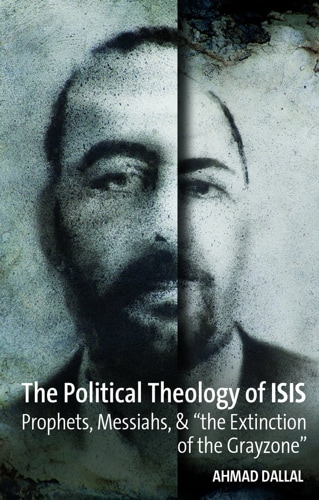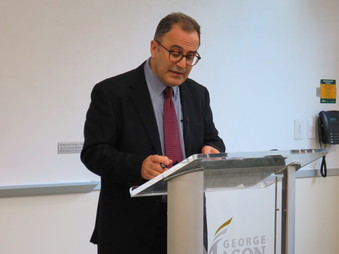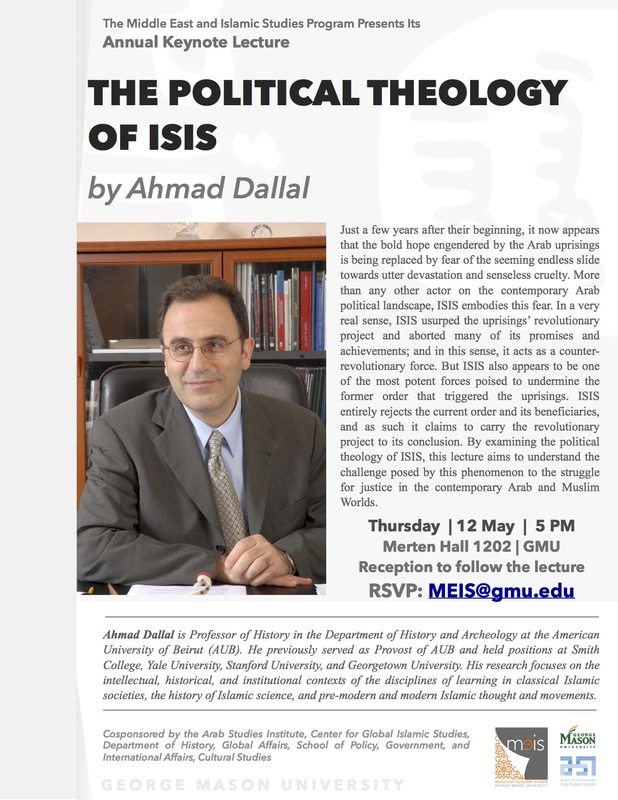- FAMA
- Researchers
-
Projects
- MESPI
- Knowledge Production Project >
-
Political Economy Project
>
- Development and the Uprisings
- Class Formations and Dynamics
- The Palestinian Economy: Fragmentation and Colonization
- Tunisia: A Political Economy in Transition
- Migrant States, Mobile Economies: Rethinking the Political in Contemporary Turkey
- Political Economy of the Middle East: Continuities & Discontinuities in Teaching & Research
- 2016 Political Economy Institute
- The Lebanon Project >
- The Palestine Project >
- The Civil Society Project >
- Middle East Media Project >
- The Egypt Project >
- Refugees and Migrants Project >
- Black-Palestinian Transnational Solidarities Project
- Initiatives
- Events
- Summer Institutes
- Internships
- Blog
POLITICAL ISLAM, ISIS, AND SECTARIANISM
UNDERSTANDING THE ISIS PHENOMENON
28 July 2015 - Beirut, Lebanon
|
The meteoric expansion of the ISIS movement in Iraq, Syria and beyond during the past year has led to numerous, often conflicting interpretations of this phenomenon and its seeming success, as well as divergent perspectives on its prospects and future.
The workshop, “Understanding the ISIS Phenomenon," jointly convened by the Arab Studies Institute and the Issam Faris Center of the American University of Beirut on 28 July 2015, sought to promote and provide a multi-dimensional, inter-disciplinary examination of its subject. The purpose of this workshop was to achieve a comprehensive understanding of the Islamic State phenomenon, both in terms of the contextual factors that have produced it; its territorial, organizational, political, socio-economic, and religious-theological features; the extent of continuity and change with respect to other Islamist and particularly other radical Jihadi movements; and informed discussion on its further trajectory. |
|
|
|
SECTARIANISM, IDENTITY, AND CONFLICT IN ISLAMIC CONTEXTS15-17 April 2016 - George Mason University
The Ali Vural Ak Center for Global Islamic Studies and the Middle East and Islamic Studies Program at George Mason University, together with the Arab Studies Institute (ASI), organized a two-day conference, “Sectarianism, Identity and Conflict in Islamic Contexts: Historical and Contemporary Perspectives” on 15-17 April 2016 at George Mason University’s main campus in Fairfax, Virginia. Composed of a keynote address delivered by Ussama Makdisi of Rice University and five individual panels, the conference brought together more than twenty academics, policy experts, and journalists to examine the topic of “sectarianism.”
|
Conference organizers emphasized that they wanted to capture the complexity of sectarianism as a historically specific phenomenon, rather than a static expression that is explained away as an expression of religious dogmatism. The conference opened on Friday evening with a keynote by Ussama Makdisi. Makdisi provided a nuanced historical analysis of the “discursive framing of sectarianism,” especially in the Middle East. Makdisi argued that a long and problematic tradition of scholarship on the Middle East helped perpetuate sectarianism as an “inevitable” outcome in the region. Similarly, this approach presented sectarianism as the result of “age old social and political divisions,” as President Obama put it. Makdisi emphasized that racism in America and Europe was not studied in the same fashion as the phenomenon of sectarianism in the Middle East. Makdisi explained the processes by which an ecumenical language and understanding of difference was slowly replaced with a sectarian alternative especially in the nineteenth century...
Read More
Read More
The Political Theology of ISIS:
Prophets, Messiahs, & "the Extinction of the Grayzone"
By Ahmad Dallal
|
More than any other actor on the contemporary Arab political landscape, ISIS represents the most expansive and potent threat to the territoriality of the modern Arab nation states, and it has exceeded the expectations of all observers in its expansiveness and resilience. While it is true that the rise of ISIS was enabled by a confluence of interests, it is now abundantly clear that ISIS has a dynamic project of its own and is not a mere proxy for such interests. ISIS entirely rejects the current order and its beneficiaries, and as such, it claims to carry the revolutionary project to its conclusion. The ISIS alternative to the failed Arab states is not just a normative Islamic cultural identity that guides the actions of the state, but an Islamic State that is itself the embodiment of the imagined new order. By examining the political theology of ISIS, this essay aims to understand the challenge posed by ISIS to the struggle for justice in the contemporary Arab and Muslim World.
click above for more details at
TadweenPublishing.com |
Ahmad Dallal giving the MEIS Program's Keynote Lecture at George Mason University on "The Political Theology of ISIS"
|
- FAMA
- Researchers
-
Projects
- MESPI
- Knowledge Production Project >
-
Political Economy Project
>
- Development and the Uprisings
- Class Formations and Dynamics
- The Palestinian Economy: Fragmentation and Colonization
- Tunisia: A Political Economy in Transition
- Migrant States, Mobile Economies: Rethinking the Political in Contemporary Turkey
- Political Economy of the Middle East: Continuities & Discontinuities in Teaching & Research
- 2016 Political Economy Institute
- The Lebanon Project >
- The Palestine Project >
- The Civil Society Project >
- Middle East Media Project >
- The Egypt Project >
- Refugees and Migrants Project >
- Black-Palestinian Transnational Solidarities Project
- Initiatives
- Events
- Summer Institutes
- Internships
- Blog





